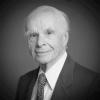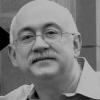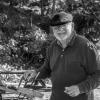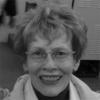Youth: A Dynamic Peaceful Force
Helen Danesh speaks for the first 15 minutes. She begins by reading special greetings from the Maori people of New Zealand—in their native tongue. Her talk focuses on the revolutionary qualities of youth and how youth can serve as a catalyst for world peace. John Danesh is next and speaks for 13 minutes on the evolutionary qualities of youth in the development of world unity. John Hanley is next and warns that humanity now has weapons that can destroy the earth; thus it is imperative that the work for world peace become a chief focus of human endeavor.
Creating a New World Order: The Baha’i Experience
“What is the Bahá’í paradigm for a new world order; not only at a thoretical level but also at a practical level?” Dr. Danesh describes three dimensions of unity. Describes the three ways of dealing with human violence. What is needed is an “integrated human society”; integrated in every way: racially, socialy, sexual equality, etc. The indulgent society must give way to one that is responsible, cooperative and compassionate. That society is the Bahá’í society.
From Oppression to the Feminine Principle in the Establishment of World Peace
Dr. Jane Faily
Jane Faily starts by saying that as the “all human institutions are in disorder”; so too is Bahá’í marriage. We live in one of the most trying times in history.
Ms. Faily then explores the traditional roles of men and women in marriage and society. In the past there was stability and harmony in marriage; that order rested on the dominance of men and the compliance of women. That has disappeared. “We are in an awkward age.” The harmony has vanished. We need to recreate the institution of marriage based on Bahá’í teachings.
Dr. Faily begins by explaining she has never before given a “paper”. She feels strongly that the institution of motherhood has been extremely undervalued by society. She explores how women, historically, came to lack a proper education, which put her at a disadvantage in child-rearing. Motherhood can change the world for the better. She quotes famous thinkers, such as Aristotle, who inserted negative views of women into Western culture. Describes how differently women approach issues from men.
Science and Prophecy: Humankind’s Path to Peace in Global Society
Dr. Lazlo, a non-Bahá’í, says he will share some “new findings, some new insights that are found in the sciences today.” He quotes Shoghi Effendi, who said, “the fundamental purpose of religion is to promote concord and harmony, that it must go hand-in-hand with science, and that it constitutes the sole and ultimate basis of a peaceful, an ordered and progressive society”. He goes on to say that without this purpose nothing can be achieved; nothing can go forward. Dr.
The Role of Feminine in the New Era
Gregg Dahl declares that “the subject tonight is women and peace”. He then relates peace to war. The Encyclopedia Britannica devotes sixty pages to war and no pages to the subject of peace. Over one hundred years ago ‘Abdu’l-Baha wrote, in The Secret of Divine Civilization: There is the well-known case of the ruler who is fostering peace and tranquility and at the same time devoting more energy than the warmongers to the accumulation of weapons and the building up of a larger army, on the grounds that peace and harmony can only be brought about by force.
Counterpoint
Mrs. Woodman reviews God’s tradition of sending male Messengers, such as Abraham, Moses, Jesus, Muhammad and Bahá’u’lláh. It’s patriarchal. From Abraham forward: “The impregnating power of the male rather than impregnated power of the female that is given priority.” Through the process of pregnancy however the male and female become one flesh. Both must contribute to make one. At forty minutes into the presentation the microphone is turned over to Bahiyyih Nakhjavani who explains that we are in an era of specialization and she is not a specialist in peace.
Hawks, Doves and the Promise of World Peace
Brad Pokorny discusses the two extreme positions—hawks and doves—on the continuum of war and peace. “The Promise of World Peace” addressed to humanity by The Universal House of Justice, offers common ground to both the hawks and the doves because both groups want peace…but, want it according to their preferred strategy. Both groups want “security”. Hawks want security through material means such as guns, tanks, and “weapons in space”. For doves the material means of hawks equals “insecurity” rather than security.
Century of Light
Mr. Puroshothaman quotes ‘Abdu'-l Bahá, Who said, “The reality of man is his thought, not his material body.” He went on to say, “If a man’s thought is constantly aspiring towards heavenly subjects then does he become saintly; if on the other hand his thought does not soar, but is directed downwards to centre itself upon the things of this world, he grows more and more material until he arrives at a state little better than that of a mere animal” In the past one hundred years humanity has passed through a crucial turning point.
Strategy of World Peace
Bahia Mitchell asks why is the planet ready for unity. She then reviews the present condition and the history of the century in which we live. “The present society must either be reborn or perish”. Terrorism reared its head in the 1930s—it is now worldwide. Shoghi Effendi referred to some of these negative effects as having a “cleansing effect”. The UN started with 46 members and now has 167 member nations. A few empires controlled many nations, now many more are independent. Humanitarian endeavors multiply at a high rate.
Address by Amat’ul-Baha Ruhiyyih and Ali Nakhjavani of the Universal House of Justice
For the first twelve minutes ‘Amatu’l-Baha Ruhiyyih Khanum briefly reviews the history of Hands of the Cause of God and recognizes Hand Muhammad Varqa who is present in this meeting. She goes on to describe the elected and appointed institutions and then introduces Mr. ‘Ali Nakhjavani, member of the Universal House of Justice since 1963. Mr. Nakhjavani praises the Association for Bahá’í Studies (ABS) and says “They provide an excellent medium for the study of the teachings of our Faith.
The Promise of World Peace
The people of the world are self-destructive. We harm ourselves and we harm our environment. We may even destroy this home of ours…our planet. The idea of peace is not a vague and impractical dream. The vision of peace is always before us. We Bahá'ís believe peace can and will come to pass. But we have to be active in the cause of peace. Peace is dependent on the consciousness of the oneness of humankind which is the central theme of the Bahá'í Faith.
Nuclear Arms and Students
Mr. Abrahams explains that he has taught teachers how to approach this subject in the classroom to avoid being labeled “communists” by parents and to not instill fear into the students. It is not enough to be “for peace” we must have methods to achieve it. Gives two reasons why our children should “become active participants for peace”. He details some of the curriculum and exercises taught to students on the subject of nuclear disarmament. Studies showing attitudes and fears relating to the issue of nuclear war are cited.
Ain’t Gonna Study War No More
Dr. Eyford discusses the vital role that education plays in order to move our world toward "The Most Great Peace". He describes the five ways in which learning is facilitated, as proposed by the Club of Rome; these five are: language, tools, values, human relations and images. Dr. Eyford points out how the ideas presented by the above-mentioned society are in harmony with the teachings of the Baháí Faith and emphasizes the need to develop the last three of these as the means of achieving "universal salvation”, rather than just personal salvation.
Whatever Happened to the End of the World
In this lecture, Dr. Woodman contrasts the "end of the World" views of the nineteenth century philosophers Hegel and Nietzsche, with the Sacred Writings of Bahá'u'lláh which proclaim the end of the Old World Order and the spiritual springtime, in which all things are made anew. He states that man, through the prophets, is given the gift of himself. Man must turn to himself and see God within him, to become spiritual. Dr.
Peace Forum: Creating a New World Order
Panelists: Hossain Danesh, Ervin Laszlo, Bahiyyih Nakhjavani, Marion Woodman and Ross Woodman. Each panelist talked about the importance of achieving peace on the earth and how we could achieve that peace through the teachings of Bahá’u’lláh. The Old World Order will soon be rolled up and a new one spread out in its stead; one that is characterized by oneness and peace. Peace is has always been desired by all, nevertheless it will require society to move towards equality, love and justice. We won’t achieve such a peace through violent means.
Preparing the Successful Paper
Dr. Betty Fisher, Editor of the Bahá’í Publishing Trust (BPT) in Wilmette since 1971 and also Associate editor of World Order Magazine since 1968. Mr. Rich Hill is an associate editor of the Bahá’í Publishing Trust (BPT) in Wilmette for the past five years. Their joint presentation is broken into six sections. There is a strong suggestion that would-be authors of scholarly articles read the recent Plan from the Universal House of Justice for topics to write about. She reads many quotations of Shoghi Effendi’s advice to those who would write about the Bahá’í Faith.
Universal Peace and The Role of Education
Mrs. Ghandi read this quotation from the Bahá'í writings "There is not one soul whose conscience does not testify that in this day there is no more important matter in the world than that of Universal Peace". The foremost urgent requirement is the promotion of education. Education is a major factor that influences the lives of individuals. She also spoke about how family and society influence people’s minds. Bahá'u'lláh emphasized the role of education in the elimination of wars and disputes. There is a fundamental difference between knowledge and education.
Absolute Poverty and Utter Nothingness
Bahá’ís will recognize the title of this talk as the Seventh Valley in Bahá’u’lláh’s books: “The Seven Valleys” and “The Four Valleys”. This is “The Valley of True Poverty and Absolute Nothingness”. Bahá’u’lláh wrote that “This station is the dying from self and the living in God, the being poor in self and rich in the Desired One.” Clarken relates this theme to the fear of God which in the Qur’an and the Bible is an expression of our nothingness. The philosopher Karl Jaspers identified only five great thinkers who practiced and taught detachment from the material world.
Persian Presentation
Mr. Nakhjavani explains that the reason for this talk while he was in Canada was due to a number of questions that he received from about 10 believers concerning the situation in Iran. Before addressing that topic he brings the attention of the audience to the significance of befriending, visiting and teaching the natives of Canada. Mr. Nakhjavani also encourages the Iranian Baha’i youth who had recently moved to Canada as refugees to consider the option of travelling to other countries to teach and serve the Faith for a few months if the authorities would allow them.
Violence in the Home
Carolyn Kornatz tells us that in 1979 forty percent of all women murdered in the U.S. were killed by their partner. She calls for parent education. She says, full sexual equality is essential for the prevention of wife beating” She quotes an expert who said, “Men who are comfortable in equal relationships with women are less likely to exploit children sexually.” quotes ‘Abdu’l-Bahá, “The world in the past has been ruled by force, and man has dominated over woman by reason of his more forceful and aggressive qualities both of body and mind.
International Health, the Arms Race and Survival
Andrew Link focuses his talk on the health relationship to nuclear weapons. He doesn’t feel that transforming ‘swords into ploughshares’ will be difficult. The arms race and global poverty are closely linked. During his time in Africa he worked as a doctor among the rural poor. Reports that UNICEF found that 40,000 children under five die every day. That’s 15 million a year. Most die of preventable causes. This number is equivalent to a Hiroshima sized nuclear bomb going off every three days.
The Whole Individual
Dr. Jane Faily
Jane Faily starts by saying that as the “all human institutions are in disorder”; so too is Bahá’í marriage. We live in one of the most trying times in history.
Ms. Faily then explores the traditional roles of men and women in marriage and society. In the past there was stability and harmony in marriage; that order rested on the dominance of men and the compliance of women. That has disappeared. “We are in an awkward age.” The harmony has vanished. We need to recreate the institution of marriage based on Bahá’í teachings.
Dr. Faily discusses the interrelationship of individual and global longing for wholeness and harmony, which leads to peace. She labels the three elements of growth as desire, thinking and action. Balance in these aspects results in moderation, while imbalance leads to exaggeration. The destructive forces of racism and nationalism are brought about by imbalance. The human soul directs desire, learning and action. How we develop thes elements makes us the raw material for either peace or war.





















